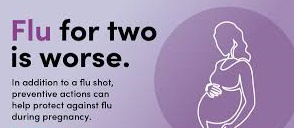Influenza during pregnancy
Influenza during pregnancy

Influenza during pregnancy is considered a serious illness. Pregnant individuals with influenza are more likely to be hospitalized than non-pregnant individuals. If influenza is diagnosed early, safe treatments during pregnancy can help reduce symptoms and shorten the duration of the illness. The best way to prevent influenza is to get a flu vaccine, which is safe for pregnant individuals. When an infected person coughs or sneezes, the virus spreads through the air and even on surfaces.
What is influenza?
Influenza is a type of respiratory infection that often occurs in autumn and winter. The cause of influenza is a type of virus that spreads easily. Pregnant individuals typically experience more severe influenza symptoms and are more likely to be hospitalized. If you are pregnant and have flu symptoms or similar, be sure to see a doctor immediately.
Who is at greater risk of getting influenza?
During pregnancy, you are at greater risk of getting influenza because your immune system, which fights disease, is somewhat suppressed. This suppression increases the risk of various infections, including influenza. Pregnant women who have not been vaccinated against influenza are more at risk. Studies show that the flu vaccine reduces the risk of influenza in pregnant women by up to 50%.
If I get influenza during pregnancy, will my baby be affected?
Getting influenza during pregnancy may affect the baby’s growth. Fever, a primary symptom of influenza, can disrupt the development of the neural tube and cause other problems in the fetus. Some studies also show that influenza during pregnancy increases the risk of miscarriage, preterm birth, and low birth weight.
What causes influenza during pregnancy?
The cause of influenza in both pregnant and non-pregnant individuals is the same. The influenza virus infects the nose, throat, and lungs, causing respiratory symptoms similar to a cold. You can get influenza through breathing in or touching surfaces contaminated with the virus. The influenza virus can spread from one day before symptoms appear to five to seven days after symptoms begin. This means an infected person can spread the virus before they even realize they are sick.
What are the symptoms of influenza during pregnancy?
The most common symptoms of influenza during pregnancy include:
- Chills
- Dry cough
- Headache
- Loss of appetite
- Nasal congestion
- Muscle aches
- Runny nose
- Sore throat
- Sudden moderate to severe fever
- Fatigue
How is influenza treated during pregnancy?
If you see a doctor early, they will give you antiviral medication. These medications do not cure the illness but prevent symptoms from worsening. Most doctors prescribe Tamiflu, which studies show is safe during pregnancy. Other safe medications that can reduce flu symptoms during pregnancy include acetaminophen for fever and pain, and dextromethorphan and guaifenesin for cough and respiratory symptoms.
What home care remedies are available for influenza during pregnancy?
Influenza may last for a week or more. You should rest and drink plenty of fluids. Take medications as prescribed and eat nourishing foods and soups.
How can I prevent influenza during pregnancy?
The best way to prevent influenza during pregnancy is to get a flu vaccine before the flu season starts. The flu vaccine is safe for you and your baby at any stage of pregnancy. Studies show that the flu vaccine during pregnancy also protects the baby after birth. Antibodies from the vaccine are passed to the baby during pregnancy and continue to be transferred through breastfeeding after birth. This is crucial because babies under six months cannot receive the flu vaccine.
Pregnant women should also carefully follow all flu prevention guidelines:
Avoid close contact with infected individuals.
Avoid touching your eyes and nose.
Clean home and work surfaces with fragrance-free and hypoallergenic disinfectants.
Wear a mask in crowded and enclosed spaces.
Wash your hands frequently.



Your Comment :